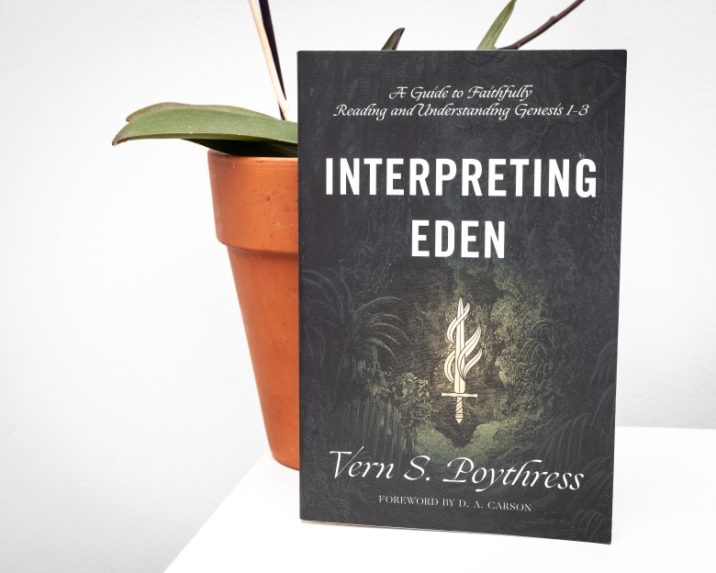Reading Interpreting Eden was a delightful theo-philosophical exercise, because Poythress, in his typical manner, engages highly complex scientific, hermeneutical, and ideological issues in the highly contentious waters of Genesis 1–3 with eminently delightful prose and a grace worthy of admiration. We highly recommend this book to anyone wishing for a comprehensive exegetical, theological, and philosophical study of the opening chapters of the Bible, which also serves as a model of gracious scholarly engagement with alternate views on fundamental issues in biblical interpretation.
What is the major premise behind Interpreting Eden?
VSP: We can make good progress in understanding Genesis 1‐3 by having the right interpretive principles. There are quite a few principles that help. God is the absolute Lord. He can work miracles when he chooses. The Bible is the trustworthy word of God. Modern science relies on the regularities of God’s rule over the world, but cannot rightly forbid exceptions. This last principle applies especially to one‐time events in the past, which cannot be the focus of repeated experiments in the present.
Can you give us a brief behind‐the‐scenes of how Vern Poythress approaches and completes a writing project such as this, and did your approach differ if at all from your other writing projects?
VSP: I have been thinking about Genesis and modern scientific claims for over fifty years. So my ideas have had time to grow. In 2006 I published a book Redeeming Science (Crossway), which addressed some of the issues. But I continued to think about hermeneutical principles and Genesis. More recently I wrote a series of journal articles (in the Westminster Theological Journal) dealing with interpreting Genesis 1‐3, and decided that they could contribute to a whole book on the subject.
[callout img=”https://files.logoscdn.com/v1/files/7752105/content.jpg?signature=jIOTUgP_VNoizsGZ7AdRYMAVqUU” text=”Poythress’ Redeeming Science is just one of twelve exceptional titles in” link_url=”https://www.logos.com/product/55832/crossway-apologetics-collection-2#011?utm_source=academic.logos.com&utm_medium=blog&utm_content=2019-05-22-vern-poythress-interpreting-eden&utm_campaign=promo-logospro2019″ link_text=”the Crossway Apologetics Collection 2″]You title the introduction to the book, “The Need.” What is the “need” we as the church have to get Genesis right, and why are these first chapters of the Bible so important to our understanding of the rest of Scripture?
VSP: The first chapters of the Bible describe God, the creation of the world, the creation of mankind, and the fall of Adam and Eve. These early events form a framework for understanding God, the world, ourselves, and the predicament of sin. Getting this framework right is important for understanding who Jesus Christ is and what is the meaning of the redemption that he accomplished on earth.
Early in the book you identify three modern myths that interpreters must face when approaching Genesis 1. Can you outline these for us, and briefly mention how faithful students of Scripture can avoid these myths? Do these myths affect our approach to the rest of the Bible, or are they limited just to the question of creation/evolution/etc?
VSP: The first myth is what I call the myth of “scientistic metaphysics.” What I mean here is the idea that modern science shows us the ultimate nature (metaphysics) of the world, in such a way that it virtually displaces rather than supplements ordinary experience. Because God created us, I maintain that ordinary human experience includes experience of the presence of God (Rom. 1:18‐23). Ordinary experience has been and continues to be a valid entry‐point into the world.
Sciences capture fascinating extra dimensions, but do not invalidate the perspective in which we say, for example, that the sun rises and the sun sets. It is true that the sun rises from the standpoint of ordinary human perception. Ancient knowledge by ordinary people, grounded in such perception, is in that sense on the same level as ours. The Bible speaks to ordinary people in ordinary ways, and such communication is valid.
The second myth is the myth of progress. This myth says that our modern Western societies are superior to the past, not only technologically, but socially, morally, and spiritually. It tends to make us look down on the Bible as an ancient, “primitive,” book, and not to probe the wisdom and the sophistication with which God speaks to people of earlier times.
The third myth is the myth of easy understanding of other cultures. The ancient Near East contained multiple cultures, changing and interacting over hundreds of years, and the evidence left for us to examine is fragmentary. It is easy to underestimate the challenge of thinking through what a whole culture is like, and to impose oversimple descriptions, when it comes to issues like ancient views of the world as a whole. Ancient societies had intense interest in the spiritual world, and this interest may dominate, rather than physicalistic accounts of how the world works.
[callout img=”https://covers.logoscdn.com/lls_rdmngphlspqstns/cover.jpg” text=”Poythress addresses philosophy as an approach to life in” link_url=”https://www.logos.com/product/165995/redeeming-philosophy-a-god-centered-approach-to-the-big-questions?utm_source=academic.logos.com&utm_medium=blog&utm_content=2019-05-22-vern-poythress-interpreting-eden&utm_campaign=promo-logospro2019″ link_text=”Redeeming Philosophy: A God-Centered Approach to the Big Questions”]
Halfway through the book, you provide a helpful outline of the hermeneutical principles advocated in Interpreting Eden. This list of 15 principles seems like a trustworthy roadmap for any pastor, student, or scholar to follow. But if you had to choose, is there one that stands apart, under which the others should be subsumed, and why?
VSP: A difficult question. I suppose I could do worse than point to the first principle: “There is one true God who does as he pleases.” It is easy to lose sight of this principle within a modern cultural context. Biblical scholars and theologians, as well as ordinary people, can be unconsciously influenced by the elite, who have abandoned God in favor of a predominantly mechanistic picture of the world. This modern view gives us a world in which God is either nonexistent or involved only at a private, psychological level.
Given your previous publication history, what is the relationship between Genesis 1‐3 and issues such as inerrancy, science and Christianity, miracles, and logic?
VSP: Interpretation of Genesis 1‐3 is influenced by all the topics that you list. And in all the topics people can go off the rails if they unconsciously absorb the predominant views coming from prestigious Western institutions like the universities and the media. Christians are called by God to renew their minds (Romans 12:1‐2), to think differently from most of the culture around them.
How essential is the ANE to our understanding of Genesis 1‐3? Have we paid enough attention to the non‐biblical sources contemporaneous to Moses? Or do they have more to tell us and thus to refine our comprehension of the Creation event?
VSP: There are relations between Genesis 1‐3 and nonbiblical documents in the ANE. The question is what kind of relations these are. One of the issues is whether historical and social‐anthropological study of ancient cultures treats them as all on a common level. Or can God speak his own message that differs? Can a differing message still make contact with people living in God’s world and in cultures all of which cannot escape God? Is there a difference between the truth in religion, offered in the Bible, and the many counterfeits, ancient and modern? Or is all religion merely a human response to a vague sense of the transcendent? I maintain that it makes a difference if we believe in a God who rules and speaks.
In addition, my book brings up the issue of the genre of Genesis. Comparative evidence leads to the conclusion that Genesis is ancient Hebrew nonfictional prose narrative, in the same broad category with Numbers and 1‐2 Samuel, not the ANE category of poetic narrative about the gods.
[callout img=”https://files.logoscdn.com/v1/files/6807179/content.jpg?signature=1axO4cBlVa6_mudYlnMIXs8ulZ4″ text=”Poythress presents a trinitarian understanding of human relationships, and how they are broken, in” link_url=”https://ebooks.faithlife.com/products/14531/redeeming-sociology-a-god-centered-approach?utm_source=academic.logos.com&utm_medium=blog&utm_content=2019-05-22-vern-poythress-interpreting-eden&utm_campaign=promo-logospro2019″ link_text=”Redeeming Sociology: A God-Centered Approach”]
Since you spend one third of the book discussing “time” in Genesis, and since much of the contemporary discussion hinges on this one thing, what is meant by the Hebrew word yom (“day”) in Genesis 1?
VSP: The Hebrew word means “day.” (The light can also be called “Day,” Gen. 1:5). But when we say that, does it immediately answer all the questions? The difficulty is that there are a variety of ways of timing the length of a temporal period. In the present providential order, we have many regular rhythms that intertwine with each other nicely. But the six days in Genesis 1 took place before all the elements of the present providential order were in place. It is easy for a variety of modern views too quickly to read back into Genesis 1 details of the patterns that belong to the present order.
You provide four substantial appendices at the end of Interpreting Eden. I was struck, in particular, by your discussion in Appendix A, entitled, “Genesis 1:1 Is the First Event, Not A Summary,” in which you engage directly with Waltke’s articulation of the “summary view”. What is the fundamental difference between the summary view and the “initiation view”?
VSP: The summary view says that Gen. 1:1 is a summary or heading for 1:2‐31. Verses 2‐31 unpack verse 1 in detail, by specifying the various particular things that God did in order to create. The first‐event view, by contrast, says that Gen. 1:1 describes the very first act of creation, in which God brought the cosmos into being, with no created antecedents. It was “out of nothing,” as theologians say. I hold to the first‐event view. I believe that the summary view has much less in its favor than many interpreters have thought.
Ultimately, what is at stake for the church due to our handling of Genesis, in terms of her relationship to the world, her own health, and her understanding of God?
VSP: Elite Western culture has come to reject the God described in the Bible. With that rejection naturally comes the rejection of the idea that God created the world in a series of steps, and that he is intimately involved in the world ever since, both in ordinary providential rule over the world and in miracles. Elite culture replaces this view with an ultimately impersonalist view, with matter, energy, and motion as the “last thing back.” It devalues persons, and leaves every person with the task of constructing his own meanings in a world that is ultimately meaningless.
Genesis 1‐3 has a powerful message to the modern world, if only we got hold of it and believed it. It tells who God is, and also who we are, human beings created in the image of God and now fallen and sinful. The redemption of Jesus Christ, which is the crucial message of the Bible, makes sense only within the framework of understanding who God is and who we are. The overall framework, and the meaning of Jesus Christ, and his worthiness to be trusted for redemption, are all at stake in a conflict between God’s truth on the one hand and various forms of return to paganism on the other.
Finally, what are you working on now that we should anticipate reading in the future?
VSP: I am working on a book, The God of Majesty, which considers the attributes of God in the light of the Trinity. I hope also to have a book on Redeeming Our Thinking about History.
For more of Poythress’ stimulating theological and philosophical work, get a hold of his Redeeming series, including:
]]>






